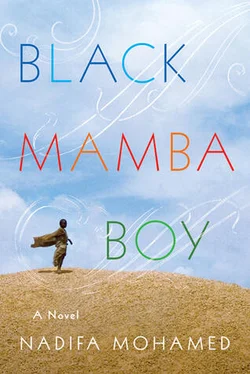Jibreel pulled at Jama’s arm but he refused to rise, to open his eyes, and Jibreel withdrew to stand by the wall and wait. At last, Jama inhaled a deep breath and took hold of his father’s flimsy suitcase. The touch of the handle, its shape molded to his grip, its color stained with his sweat, set Jama’s hand aflame. He stared into the stranger’s eyes, and the man nodded and walked away, back over the horizon.
Jama crouched down, bent over the suitcase, his body taking the shape of the boulders placed above nomads’ graves. He untied the string holding the case shut and delicately opened it. He hoped to find his father’s head inside, just so that he would finally know what he looked like. He wanted to press his hand against his father’s stubble, to trace the face that contained the only likeness of his own. Instead, he found a threadbare mauve ma’awis, a few notes and coins, an amber tusbah, a worn-down toothstick, a stringed musical instrument, and a rusted toy car. Jama pressed his face against the grit of the Eritrean wasteland, his journey at a bitter end. The moon hid in shame and left Omhajer in black. One by one, the planets Jama’s life orbited around had spun away and he floated in starless obscurity.
OMHAJER, ERITREA, DECEMBER 1936
A plaintive song creaked out of the wind-up gramophone, a soaring soprano backed by a full orchestra battling against the din of the teahouse. The turntable wobbled with every revolution, its handle turned by a piece of human furniture. The tassel of Jama’s fez fell over his eyes as his body lurched back and forth behind his arm. A group of Italian soldiers sang along to the gramophone, holding their Melotti beers aloft and rocking on broken chairs. Already giddy with power, they sang into Jama’s face, spittle flying from booze-slackened mouths. Askaris walked past and laughed at their inebriated officers celebrating their savior’s birth. Jama didn’t laugh or pay notice to the Italians, he was counting, he was up to six hundred and eighteen turns and would start over again when he reached a thousand. His arm ached but he carried on. Counting occupied the parts of his mind that were becoming unruly and wild, the parts of him that wanted to break off the arm of the gramophone and slit necks with the sharp needle. He swapped arms without losing count and wiped the spittle on his face against his shoulder. The fez had been placed on his head by one of the drunken men to loud laughter as Jama’s head disappeared into it. Even these Italians had probably known his father, had known and owned him more than Jama ever would. A cockerel pranced out onto the terrace, pecking at fragments of roasted corn on the floor. Its long red neck worked up and down like a piston as it made its stately progress between the men’s feet. The voice of a bombastic tenor filled the air and covered up the squawks of the proud bird as he was carried back to the kitchen by the cook, a tight grip around his wrinkled old neck, his yellow feet feeling impotently for the ground. Jama watched the cockerel’s exit and his ear followed the cook’s footsteps, waiting for the scraping of knife against feathers, muscle, tendons. Death seemed inescapable to him now, he wondered at how he had never taken heed of it before. He felt his heartbeat race and skip and tumble over itself but he continued working the gramophone, the resultant music assuring him that he wasn’t dead but real live flesh and blood. The Italians slid off their chairs, and one of them left a lira on the table, plucking his trophy fez off Jama’s head. The Fascist eagle’s beady eyes and outstretched wings threatened Jama from the coin and Jama stared back, his sore arm still needlessly turning the gramophone crank.
Every day a cockerel heralded dawn with all the urgency of an angel blowing the last trumpet. Jibreel crouched over a short broom, sweeping dust and dirt out of the tent opening, his figure throwing Jama back into darkness each time he passed the doorway. Dust blew up Jama’s nostrils and into his mouth and eyes, gritty and salty. Jama threw his arm across his face but Jibreel continued sweeping around him, motes of dust dancing around his head in the weak-tea-colored morning light. In grief, Jama felt cut off from life, as if there were cotton wool in his ears, in his mouth, in his mind, around his heart. His surroundings seemed muted and distant, even his dreams came to him in dull monochrome. Behind him Jama could hear the daily massacre of cockroaches and dung beetles. The unfortunate creatures did not understand the demarcation of their land and Jibreel’s, so were doomed to be bludgeoned by his broom every morning. Their shells were smooth iridescent gems in the dusty tent, they tinkled like jewels when with a flick of the wrist Jibreel threw them onto the hard soil outside. Jama waited for Jibreel’s shadow to disappear before retrieving his aday toothbrush; he barely spoke to Jibreel and the others now, he could not bear their small talk and laughter. He was approaching his thirteenth year and already his limbs were being stretched on an invisible rack, lengthening drastically and painfully each night. His mother’s amulet hung around his neck, a dull weight. Jama massaged his limbs, pulled himself to his feet, and stalked off toward the teahouse, his head and eyes down to avoid his neighbors’ greetings.
With a tray of dirty glasses resting in his hand, Jama surfed over the lunchtime wave of diners. The Italians ate first, and only after the last European had his fill could Africans be served. Plenty of saliva and dirt went into those first batches of spaghetti bolognese. A soldier with two stars on his uniform grabbed Jama by the wrist to chase after his order, Jama twisted his hand free and scooted back to the kitchen, and as he ran in, the tray balanced carefully in his hands, he tripped over a headless goat that lay sprawled across the floor. The glasses flew into the air and smashed against the wall. “Bravo, Jama! There go your day’s wages,” laughed the Eritrean cook.
“Why did you leave the bloody goat in front of the door?” snapped Jama as he brushed dirt off his scraped knees.
“I need some entertainment, don’t I? Stuck in this smelly hot kitchen all day,” replied the cook, laughing harder at Jama’s peeved face.
“I’ll get you back, you dameer, just you wait and see!” shouted Jama, taking the hot plates outside. Pain and irritation scrambled Jama’s usually perfect memory, and he handed the plates to the soldiers who shouted loudest for them. A young Italian at a table of officers took them out of Jama’s singed fingers, his dark olive hands passed lightly over Jama’s, and his dark eyes fixed on the boy. Jama looked back at him. The soldier had a thin goat face, his nose was long and hooked, his eyebrows unruly. His lower lip was fuller than the top and he chewed it ruminatively.
“You’re that boy from the bus, aren’t you? Who nearly got thrown off?” the soldier asked in Arabic. Jama stayed silent.
“You don’t remember me, do you?” he continued.
“Stop talking to the Africans,” interrupted the Italian’s companion. He slapped Jama hard on his bony rear and shouted, “Move it. Move it!”
Jama stole a glance at the first Italian before running back to the kitchen, he had recognized him, it was the gangly man who had persuaded the thieving bus driver in Agordat to let him board.
“What’s the matter, Jama? You look like you’ve been bitten by a devil,” said the cook.
“One of the Italians keeps staring and talking to me.”
Cook laughed, “Shayddaans! Here, give me that glass on the side,” Jama handed it to him. Cook turned his back and slowly dribbled urine into the glass, mixing it with tea and sugar and handing the whole concoction back to Jama.
“Tell him it is free, our special drink for special customers.”
Читать дальше
Конец ознакомительного отрывка
Купить книгу












